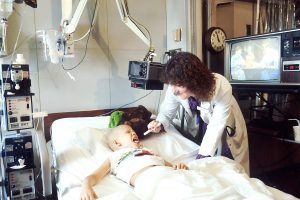
Over the last few decades, healthcare has changed drastically. These changes have prompted a new approach to patient care. While doctors still play a vital role in modern medicine, nurse practitioners fill a significant gap in the healthcare system, especially in primary care.
The roles of nurse practitioners and doctors are distinctly different. They require different education paths. They ultimately approach illness, health, and patient care differently.
In this article, we will explore the similarities and differences between these two types of healthcare professionals. By analyzing these factors closely, you will gain a better understanding of whether becoming a nurse practitioner or a doctor is the right choice for you in relation to your career and educational goals.
What is a Nurse Practitioner?
A nurse practitioner (NP) is a registered nurse that has a graduate degree in advanced practice nursing. A Master of Science in Nursing (MSN) and a Doctor of Nursing Practice (DNP) are both graduate nursing degrees. After completing one of these two degrees and passing the licensing exam, you become a nurse practitioner.
Different nurse practitioner tracks exist, with licensing based on their specializations and patient populations. A nurse practitioner’s scope of practice varies from state to state, but in general, they possess prescriptive authority and can practice healthcare independently or in collaboration with doctors.
A nurse practitioner typically focuses on primary care, which is the entry point for patients into the healthcare system and involves taking care of them on an everyday basis while also preventing and managing illnesses.
What is a Doctor?
There are two types of medical doctors recognized in the United States—an MD (Medical Doctor) and a DO (Doctor of Osteopathic Medicine). While both paths result in a degree that is basically equivalent, the premise and philosophy behind them differ somewhat. Their education continues through an internship and residency in a specialty after they graduate from medical school.
In addition to providing primary care, doctors practice in a variety of specialties, including surgery. Doctors are trained more comprehensively and differently than nurse practitioners, resulting in a different approach to medicine.
What Are the Main Similarities Between Nurse Practitioners and Doctors?
When comparing doctors and nurse practitioners, there are several key similarities. These include the ability and authority to:
- Take patient medical histories
- Evaluate symptoms
- Diagnose diseases
In addition, both have prescribing privileges and can provide their patients with diagnostic tests. Each type of provider develops a treatment plan for their patients, follows up with those plans, and refers patients to specialists as necessary.
What Are the Main Differences Between Nurse Practitioners and Doctors?
The first and most obvious difference between nurse practitioners and doctors is the level of training they receive.
Doctors:
- Generally complete an undergraduate science or liberal arts degree which is not nearly as focused as undergraduate nursing degrees.
- After completing four years of medical school, they move on to an internship, residency, and sometimes even further fellowships.
Nurse practitioners:
- Begin with an undergraduate nursing degree, including clinicals, and then pass boards to receive licensure as a registered nurse (RN).
- Then go on to obtain a Master of Science in Nursing degree, which usually takes an additional two to three years to complete.
There are differences in how each career track unfolds:
- Nurse practitioners typically finish with a master’s degree, unless they later choose to pursue a doctorate in nursing practice (DNP).
- Doctors begin their careers with a doctoral degree at the very least.
A second key difference is what the practice aims to achieve. Nurse practitioners are rooted strongly in preventive and holistic treatment, which is a fundamental philosophy of nursing. A nurse practitioner’s role is also very much about advocacy for patients and providing patient-centered care.
While doctors value their patients equally, their focus is often more technical, as they diagnose and eradicate diseases from both a clinical and scientific standpoint.
In-Depth Comparison of Nurse Practitioners vs. Doctors
1. Nurse Practitioner vs. Doctor: What Do They Do?
By advancing their education, nurse practitioners are able to take the general knowledge of registered nurses and specialize further in a specialty area or population. Nurse practitioners often focus on primary care, disease prevention, holistic health, and advocating for patients.
As part of their routine responsibilities, they review the medical histories of patients, order labs and tests, diagnose, and prescribe medications to the population of patients they are focused on.
Doctors perform tasks that go beyond those of nurse practitioners, including disease diagnosis and treatment. There are some doctors who focus on primary care, but many are trained to interpret complicated health diagnoses and formulate treatment plans that require greater specialized knowledge.
Nurse practitioners may be trained to perform some basic medical procedures. However, surgeons are required to complete additional, rigorous training after they are educated as doctors.
The biggest differences between doctors and nurse practitioners:
- Expertise
- Experience
2. Nurse Practitioner vs. Doctor: The Options for Specialization
Different areas of specialization are available to both nurse practitioners and doctors. However, nurse practitioners typically specialize in primary care or assume general hospitalist roles in acute care facilities. Despite specialization, their training is still typically limited to three to four years following completion of their undergraduate nursing degree.
When doctors specialize, they undergo rigorous training and education that typically lasts seven to eleven years. They also specialize in more specific areas than nurse practitioners.
3. Nurse Practitioner vs. Doctor: Education Requirements
As advanced practice nurses, nurse practitioners provide patient care at a higher level than registered nurses. Nurse practitioners must first obtain a bachelor’s degree in nursing (BSN) and pass the National Council Licensure Examination (NCLEX) to obtain their registered nurse licensure. After completion of their undergraduate degree, they must obtain a graduate degree in nursing—MSN or DNP, which will prepare them to sit for the nurse practitioner licensing exams in the specialty they have chosen.
The first step towards becoming a doctor is to complete a four-year undergraduate degree. They must also complete any prerequisite courses required that weren’t included in their degree and then pass the Medical College Admission Test (MCAT), the medical school entrance exam. The next step is completing medical school, an internship, and a residency program. Some doctors continue their education by completing additional fellowship programs. Fellowships allow them to dive even deeper into a specific area of study.
4. Nurse Practitioner vs. Doctor: How Much Time?
The time to become a nurse practitioner can vary depending on the degree program—traditional or accelerated. Another factor is how one obtained their registered nurse license. This entire education process will usually take six to seven years. This includes approximately four years of undergraduate study to obtain a Bachelor of Science in Nursing (BSN) degree, and then about two years to obtain a Master of Science in Nursing (MSN) degree.
This process can be sped up by going through an accelerated program or slowed down by studying part-time rather than full-time. In states that require a DNP for a nurse practitioner license, an additional three to four years of schooling will have to be completed, making the total education commitment ten to eleven years.
For doctors, the educational commitment is substantial and can easily take more than a decade. It requires four years of undergraduate study, four years of medical school, and a year of internship. The doctor is then required to complete a residency, which can last anywhere from three to seven years, depending on the specialty they are pursuing.
Ultimately, those who intend on becoming a doctor can expect a minimum of twelve to sixteen years of training and education.
5. Nurse Practitioner vs. Doctor: Education Cost
The education cost for a master’s degree in nursing and nurse practitioner licensure can vary based on several factors. The key factor is the college or university one attends and the nursing program they choose. Generally, it is least expensive to attend in-state public schools.
The same degree at a private or religious school can cost thousands of dollars more. Nurse practitioner education will include an undergraduate degree, a master’s degree, and possibly a doctoral degree. A nurse practitioner’s education can cost anywhere from $20,000-60,000 on the lower end to well over $100,000 on the higher end.
The cost of becoming a doctor includes the cost of undergraduate study and medical school, in addition to a multitude of miscellaneous fees. For undergraduate and medical school programs, tuition will differ based upon whether or not students are state residents, as well as the quality of the program. The total education cost for a doctor can easily range from almost $200,000 to well over $450,000.
6. Nurse Practitioner vs. Doctor: Educational coursework
Nursing programs at the undergraduate level offer generalized nursing courses. These include courses like pathophysiology, pharmacology, adult care, pediatric care, etc. Additionally, classes on leadership, ethics, and morality are offered. A master’s degree allows for specialization, and while some core courses will be taken, the bulk of the courses will be tailored to the population the student wishes to serve. This specialization becomes even more focused at the doctorate level.
Pre-med students may pursue a variety of undergraduate degrees. Medical school programs, however, are generally very similar from school to school. Medical school typically consists of both didactic and laboratory learning during the first two years. Classes typically include anatomy, biology, pharmacology, and patient assessment.
The third and fourth years of medical school are clinical, where students rotate through specialty departments in hospitals. Upon completion of medical school, students will begin a residency within the field of their choice. Residencies tend to be less about coursework and more about working with more experienced doctors and learning from them.
7. Nurse Practitioner vs. Doctor: Clinical Hours
Before a nurse practitioner is eligible to take the state’s licensure exam, they have to complete a minimum of five hundred direct and supervised patient-care hours. Students can split up their hours in different ways and between different populations to achieve the competencies being emphasized by their specific program track. It is possible that some students complete additional clinical hours or simulation training above and beyond this minimum requirement.
What really sets doctors from nurse practitioners during school is the amount of clinical experience that they have. During medical school, students spend two full years rotating through the hospital and outpatient clinics. Over the next three to seven years, they will accrue more clinical experience during their residency. At the end of their clinical training, doctors have thousands of hours behind them before practicing independently.
8. Nurse Practitioner vs. Doctor: Requirements for Certification and Licensure
Those who wish to become a nurse practitioner must first have a bachelor’s degree in nursing and hold an unencumbered registered nursing license. They must then pursue a Master of Science in Nursing degree and pass the nurse practitioner board examinations within their specialization track in order to be licensed as a nurse practitioner.
There are also post-graduate programs. They enable nurses to specialize further and get certified within specialized fields. Licenses for nurse practitioners are issued by individual states, while certifications are granted by specialized credentialing bodies.
Throughout medical school, doctors are required to take medical board exams, which are known as USMLEs. There are several phases to these exams, which are administered across several years, including after a student has earned their doctorate degree when they graduate from medical school. Students will take USMLE:
– Step 1:
- Upon completing the second year of medical school
- Tested over the basic health sciences, aging, nutrition, etc
– Step 2:
- Usually during the fourth year of medical school
- Tests both clinical knowledge and skills
– Step 3:
- Taken after one year of residency
- Determines whether or not a student is ready to practice unsupervised as a doctor
Doctors often choose to become board certified in their specific area of medicine. It is a way of demonstrating a high level of expertise and proficiency in that area of medicine.
9. Nurse Practitioner vs. Doctor: The Scope of Practice
The scope of practice for doctors and nurse practitioners varies greatly by state and is changing as it becomes increasingly apparent how important nurse practitioners are to filling a huge healthcare gap. Nurse practitioners operate autonomously in some states and have broad prescribing authority, whereas they are subject to varying levels of restrictions in other states. Overall, nurse practitioners must adhere to the standards of nursing and be accountable to their respective state boards.
A nurse practitioner’s practice consists of diagnosing and treating illnesses, counseling and educating patients, consulting, researching, and advocating for patients. These services can be provided within a variety of healthcare settings. Nurse practitioners, however, are primarily concerned with meeting the needs of each patient, family, or population with which they work.
A doctor’s scope of practice isn’t defined as it is for a nurse practitioner or physician assistant. Instead, state medical laws govern how doctors practice medicine. Rather than a scope, the duties and privileges of doctors are defined by hospitals, medical organizations, and specialties, as well as state and federal laws. Medical doctors are generally allowed to perform any tasks that fall under the umbrella of medicine.
10. Nurse Practitioner vs. Doctor: Where Do They Work?
There is a wide variety of settings in which nurse practitioners work. From hospitals and acute care facilities to outpatient care clinics, schools, and corporations, these settings serve a wide range of needs. Since nurse practitioners work in collaborative teams, they are highly valued in almost every area of health care where patient-centered care is a priority.
Doctors also practice in a wide variety of settings. Many work in doctor’s offices and private practices, while others work as generalists in hospitals. Many doctors visit both clinics and hospitals, spending time with patients in the hospital and in the outpatient setting. In some cases, doctors focus more on clinical research than on patient care. Additionally, doctors can also be found in government jobs or in roles such as healthcare administration.
11. Nurse Practitioner vs. Doctor: Job Outlook
While the job outlook for nurse practitioners varies by location, it is still very good. Since nurse practitioners fill an important gap in healthcare and take less time to train than medical doctors, they are in high demand.
Due to its high cost and substantial time commitment, fewer people are going to medical school than in the past. Because of a longer lifespan and advancements in healthcare, the requirements for medical care are increasing. Combine that with older doctors that are retiring or nearing retirement, there is a need to fill these positions.
What Is the Right Career Path for Me?
Choosing between a nurse practitioner and a doctor career involves weighing multiple factors, including educational time and cost, career outlook, and your overall professional and personal goals.
Ultimately, nurse practitioners and doctors have rewarding careers and are not limited to only direct patient care. They are equipped with knowledge and expertise that allow them to excel in various kinds of roles and in a wide range of settings. Your decision to become one or the other will be determined by the aspects of healthcare you consider most important and the resources you are willing to invest to achieve your goals.
Recommended Reading
- Nurse Practitioner Salary in Michigan
- Nurse Practitioner Salary in Arizona
- Nurse Practitioner Salary in California
Written by Joanne Potter
Joanne, BSN and RN, is a writer that specializes in health and wellness. She has fifteen years of experience as a Registered Nurse in the NICU (Neonatal Intensive Care Unit). Her years working at the bedside and extensive neonatal knowledge enable her to write with a deep understanding of what patients and families want from their communities. Visit her LinkedIn page.








